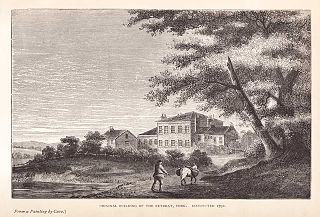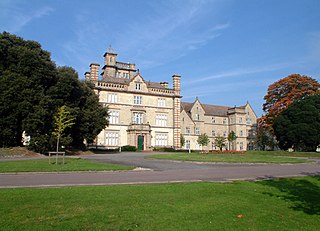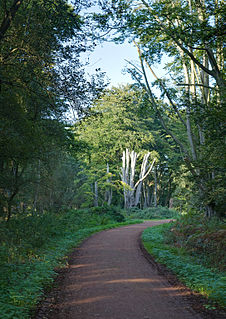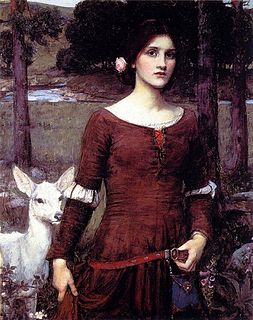
Alfred Tennyson, 1st Baron Tennyson was an English poet. He was the Poet Laureate during much of Queen Victoria's reign. In 1829, Tennyson was awarded the Chancellor's Gold Medal at Cambridge for one of his first pieces, "Timbuktu". He published his first solo collection of poems, Poems, Chiefly Lyrical, in 1830. "Claribel" and "Mariana", which remain some of Tennyson's most celebrated poems, were included in this volume. Although described by some critics as overly sentimental, his verse soon proved popular and brought Tennyson to the attention of well-known writers of the day, including Samuel Taylor Coleridge. Tennyson's early poetry, with its medievalism and powerful visual imagery, was a major influence on the Pre-Raphaelite Brotherhood.

The Elizabeth Arkham Asylum for the Criminally Insane, commonly referred to as Arkham Asylum, is a fictional psychiatric hospital/prison, named after the city of Arkham which appeared first in the stories of Howard Phillips Lovecraft, and later appearing in American comic books published by DC Comics, commonly in stories featuring the superhero Batman. It first appeared in Batman #258, written by Dennis O'Neil with art by Irv Novick. The asylum serves as a psychiatric hospital for the Gotham City area, housing patients who are criminally insane, as well as select prisoners with unusual medical requirements that are beyond a conventional prison's ability to accommodate. Its high-profile patients are often members of Batman's rogues gallery.

The Bell Jar is the only novel written by the American writer and poet Sylvia Plath. Originally published under the pseudonym "Victoria Lucas" in 1963, the novel is semi-autobiographical with the names of places and people changed. The book is often regarded as a roman à clef because the protagonist's descent into mental illness parallels Plath's own experiences with what may have been clinical depression or bipolar II disorder. Plath committed suicide a month after its first United Kingdom publication. The novel was published under Plath's name for the first time in 1967 and was not published in the United States until 1971, in accordance with the wishes of both Plath's husband, Ted Hughes, and her mother. The novel has been translated into nearly a dozen languages.
This article contains information about the literary events and publications of 1833.

John Clare was an English poet. The son of a farm labourer, he became known for his celebrations of the English countryside and sorrows at its disruption. His work underwent major re-evaluation in the late 20th century; he is now often seen as a major 19th-century poet. His biographer Jonathan Bate called Clare "the greatest labouring-class poet that England has ever produced. No one has ever written more powerfully of nature, of a rural childhood, and of the alienated and unstable self."

Arthur Henry Hallam was an English poet, best known as the subject of a major work, In Memoriam, by his close friend and fellow poet Alfred Tennyson. Hallam has been described as the jeune homme fatal of his generation.

Sir Andrew Jonathan Bate, CBE, FBA, FRSL, is a British academic, biographer, critic, broadcaster, poet, playwright, novelist and scholar. He specialises in Shakespeare, Romanticism and Ecocriticism. He is Foundation Professor of Environmental Humanities in a joint appointment of the College of Liberal Arts, the School of Sustainability and the Global Futures Laboratory at Arizona State University, as well as a Senior Research Fellow at Worcester College in the University of Oxford, where he holds the title of Professor of English Literature. From 2017 to 2019 he was Gresham Professor of Rhetoric in the City of London. Until September 2019 he was Provost of Worcester College, Oxford. He was knighted in 2015 for services to literary scholarship and higher education.

Kyon Ki (transl. Because) is a 2005 Indian romantic drama film written and directed by Priyadarshan and produced by Sunil Manchanda and Mukesh Talreja, with Orion Pictures serving as distributor. The film is a remake of Priyadarshan's own 1986 Malayalam film Thalavattam which in turn was a remake of the 1975 movie One Flew Over the Cuckoo's Nest which was based on Ken Kesey's 1962 novel of the same name. The film stars Salman Khan, Jackie Shroff, Kareena Kapoor, Suniel Shetty, Rimi Sen and Om Puri in pivotal roles, and tells the story of Anand, a mental patient whose past draws a female doctor, Tanvi, close to him, testing her own beliefs and challenging her authoritarian father, the administrator of the sanatorium in which Anand has been admitted.

The Retreat, commonly known as the York Retreat, is a place in England for the treatment of people with mental health needs. Located in Lamel Hill in York, it operates as a not for profit charitable organisation.

Fulbourn Hospital is a mental health facility located between the Cambridgeshire village of Fulbourn and the Cambridge city boundary at Cherry Hinton, about 5 miles (8 km) south-east of the city centre. It is managed by the Cambridgeshire and Peterborough NHS Foundation Trust. The Ida Darwin Hospital site is situated behind Fulbourn Hospital. It is run and managed by the same trust, with both hospitals sharing the same facilities and staff pool.
Dame Hilary Mary Mantel, is a British writer whose work includes historical fiction, personal memoirs and short stories. Mantel has twice been awarded the Booker Prize, the first time for the 2009 novel Wolf Hall, a fictional account of Thomas Cromwell's rise to power in the court of Henry VIII, and secondly for the 2012 novel Bring Up the Bodies, the second instalment of the Cromwell trilogy. Mantel was the first woman and fourth person to receive the award twice, following in the footsteps of J. M. Coetzee, Peter Carey and J. G. Farrell. The third instalment of the trilogy, The Mirror & the Light, was released on 5 March 2020 in the UK and the following July was longlisted for the 2020 Booker Prize.

Claybury Hospital was a psychiatric hospital in Woodford Bridge, London. It was built to a design by the English architect George Thomas Hine who was a prolific Victorian architect of hospital buildings. It was opened in 1893 making it the Fifth Middlesex County Asylum. Historic England identified the hospital as being "the most important asylum built in England after 1875".

The English poet Christopher Smart (1722–1771) was confined to mental asylums from May 1757 until January 1763. Smart was admitted to St Luke's Hospital for Lunatics, Upper Moorfields, London, on 6 May 1757. He was taken there by his father-in-law, John Newbery, although he may have been confined in a private madhouse before then. While in St Luke's he wrote Jubilate Agno and A Song to David, the poems considered to be his greatest works. Although many of his contemporaries agreed that Smart was "mad", accounts of his condition and its ramifications varied, and some felt that he had been committed unfairly.

Adam Samuel James Foulds FRSL is a British novelist and poet.
This article contains information about the literary events and publications of 2009.
The Walter Scott Prize for historical fiction is a British literary award founded in 2010. At £25,000, it is one of the largest literary awards in the UK. The award was created by the Duke and Duchess of Buccleuch, whose ancestors were closely linked to Scottish author Sir Walter Scott, who is generally considered the originator of historical fiction with the novel Waverley in 1814.

High Beach is a village inside Epping Forest and is located approximately eleven miles north east of central London. It is the only settlement inside Epping Forest, and falls within the civil parish of Waltham Abbey and the ward of Waltham Abbey High Beach in the Epping Forest District of Essex, and for statistical purposes forms part of the London Metropolitan Area and Greater London Urban Area.
The 2012 Booker Prize for Fiction was awarded on 16 October 2012. A longlist of twelve titles was announced on 25 July, and these were narrowed down to a shortlist of six titles, announced on 11 September. The jury was chaired by Sir Peter Stothard, editor of the Times Literary Supplement, accompanied by literary critics Dinah Birch and Bharat Tandon, historian and biographer Amanda Foreman, and Dan Stevens, actor of Downton Abbey fame with a background English Literature studies. The jury was faced with the controversy of the 2011 jury, whose approach had been seen as overly populist. Whether or not as a response to this, the 2012 jury strongly emphasised the value of literary quality and linguistic innovation as criteria for inclusion.
Rufus Wyman (1778–1842) was an American physician. He was the first physician and superintendent of the Asylum for the Insane, renamed in 1823 to McLean Hospital, part of the Massachusetts General Hospital system, and the first mental hospital in the state.

Lady Clare is a narrative poem by Alfred Tennyson, first published in 1842.














